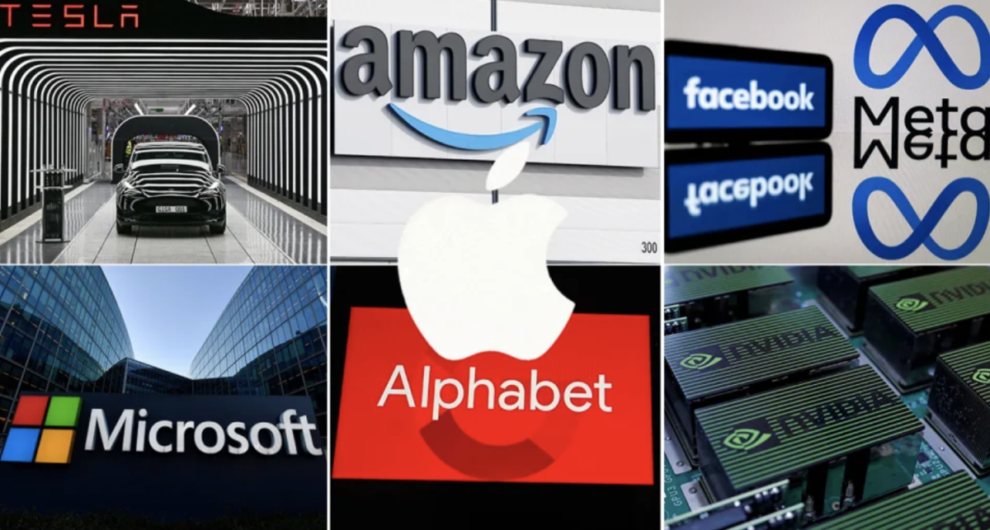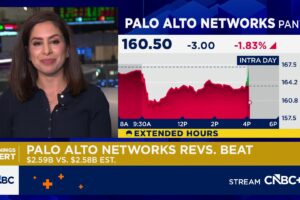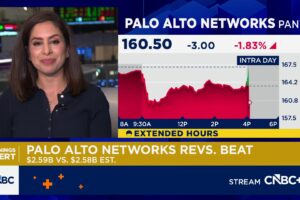Big Tech companies released their earnings results that traders used to gauge if Mag 7 stocks are still worthy of the title of ‘magnificent’.
Electric carmaker Tesla (TSLA) kicked things off for this group of market-leading tech stocks, with the others following: Alphabet (GOOGL, GOOG), Meta (META), Microsoft (MSFT), Amazon (AMZN) and Apple (AAPL). Chipmaker Nvidia (NVDA) will report later in November.
These companies have been capitalising on tech growth trends such as artificial intelligence (AI) and cloud computing, leading markets higher.
The main S&P 500 (^GSPC) index is up 22% so far this year, while the tech-focused Nasdaq Composite (^IXIC) has risen nearly 25% year-to-date.
Last year, the Magnificent 7 were responsible for more than half of the S&P 500’s gain, according to Morgan Stanley.
Susannah Streeter, head of money and markets at Hargreaves Lansdown, said: “Given the super high valuations these companies are currently trading at, signs of weakness and numbers which fall short of expectations are likely to spark jolts of volatility and may see positive sentiment seep away.”
Will this latest batch of earnings drive these stocks even higher? Here’s how each stock performed.
Elon Musk’s Tesla got the group off to a strong start, when it reported its third-quarter results after the closing bell on Wednesday 23 October.
While the results were mixed, investors cheered the company’s beats on earnings per share and higher gross margins, with the stock surging nearly 14.5% in after-hours trading.
Tesla posted revenue of $25.18bn (£19.18bn), which was less than the $25.4bn expected, according to Bloomberg consensus estimates. However, this was higher than the $25.05bn in reported in the second quarter and topped the $23.04bn it posted for the same period last year.
Adjusted earnings per share of $0.72, was ahead of an anticipated $0.60, on adjusted net income of $2.5 billion and free cash flow of $2.9bn.
Tesla’s closely-watched gross margin figure came in at 19.8%, much higher than the 16.8% expected.
In its earnings deck, Tesla said: “Preparations remain under way for our offering of new vehicles — including more affordable models — which we will begin launching in the first half of 2025.”
Musk then said in an earnings call that Tesla’s volume growth could be between 20% and 30% next year.
These details were welcome news to investors, in light of recent updates that disappointed markets. Tesla recently announced third-quarter deliveries that slightly missed expectations, while the company’s highly-anticipated robotaxi event left investors wanting more details.
Russ Mould, investment director at AJ Bell, said this strong set of results was a “reminder that, for all its recent challenges, it is one of the few operators to genuinely make the manufacture of electric vehicles pay”.
He added: “The next key test for Tesla is to hit its targeted year-on-year increase in vehicle deliveries for 2024 which will require a pretty sizable acceleration in the remainder of the year.”
Google-parent Alphabet smashed expectations with its fiscal third quarter earnings, driving a surge in its shares.
The search giant posted earnings per share of $2.12 for the third quarter, which was up 37% on the same period last year and beat forecasts of $1.83, according to data compiled by Bloomberg.
Revenue came in at $88.27bn for the quarter ended 30 September, up 15% on last year and ahead of estimates of $86.44bn.
Google CEO Sundar Pichai highlighted the growth of the cloud unit in an earnings call on Tuesday, noting that the company’s AI portfolio is attracting new customers and leading to larger deals. Cloud revenue came in at $11.4 billion, up 35% from the same period last year, surpassing expectations.
Ben Barringer, technology analyst at Quilter Cheviot, said: “Given the medium and long-term threats at play for Alphabet — the Department of Justice and AI agents — these are a very clean set of numbers.”
Earlier this month, the US Department of Justice (DOJ) said it was considering whether to recommend the break up of Google to rein in its dominance in the search engine market.
The DOJ said in a court filing that it was considering options, including “behavioural and structural remedies that would prevent Google from using products such as Chrome, Play, and Android to advantage Google search”.
This update came after a landmark ruling in August, in which a US district court said Google had illegally monopolised the online search market.
Read more: Bitcoin investors eye rally if Trump beats Harris in US election
In response to DOJ’s latest court filing, Google released a blog post entitled: “DOJ’s radical and sweeping proposals risk hurting consumers, businesses, and developers.”
“With new and improving features with search, Google has a decent future even with the DOJ trying to break it up,” said Barringer.
“YouTube has also been very stable which has allowed the business to focus on the areas it needs to, without worrying about its other core components.
“Interestingly, the cloud business was growing strongly and should provide a good read across for the rest of the sector.”
Barringer said that while innovation was coming through in the business, “the threats are big and thus the stock will struggle despite good short-term trends. Ultimately, investors await what will happen with the DOJ.”
Meta disappointed on investor expectations when it shared its guidance for the fourth quarter in its latest results.
Meta guided to revenue of between $45bn and $48bn for the fourth quarter, with analysts looking for $46.09bn. The company also said it expects capital expenses to grow significantly in 2025.
While this latest set of results weighed on shares, the stock is still up nearly 61% year-to-date.
Dan Coatsworth, investment analyst at AJ Bell (AJB.L), said that another area of disappointment for investors in the third quarter figures was daily active users growth on Meta’s social media platforms and apps. The company said this figure was up 5% to 3.29 billion individuals in Q3, but this missed the 3.31 billion market forecast.
“It’s not simply enough for Meta to move ahead, it needs to stay in the fast lane at all times as far as the market is concerned. Investors typically care about the short term and they want more, more, more,” he said.
Read more: Record number of millionaires to leave UK amid tax increase fears
“Even though Meta owns some of the world’s most popular social media platforms, it still faces significant competition from the likes of TikTok, Snapchat and YouTube. Every minute someone uses a rival platform is a missed opportunity for Meta to generate advertising income,” he added.
However, it posted beats on earnings per share and revenue. For the third quarter, earnings per share came in at $6.03, which was ahead of an anticipated $5.25, based on consensus estimates compiled by Bloomberg.
Revenue came in at $40.5bn for the third quarter, beating forecasts of $40.2bn, as well as rising on last year’s figure of $34.1bn.
Coatsworth said Meta was another company spending big on AI. He highlighted that “improvements to its AI-driven feed and video recommendations led to an 8% increase in time spent on Facebook and a 6% increase on Instagram this year. Meta AI is now helping to improve search functionality on its social media platforms, answering questions and being deployed to edit images.”
“It has further applications such as helping individuals with coding and working as a chatbot,” he added. “On top of this, Meta’s Llama large language models are being used by companies and organisations including the US government and the company continues to improve its capabilities.”
Another tech company that didn’t quite match Wall Street’s expectations with its latest results was Microsoft, despite also beating forecasts on key financial metrics.
Microsoft said commercial revenue which includes cloud services sales, came in at $38.9bn compared to expectations of $38.1bn. The company’s Intelligent Cloud segment, which includes its Azure business, brought in $24.1bn in the quarter, up 20% year over year.
However, Matt Britzman, senior equity analyst at Hargreaves Lansdown (HL.L), said that the “downbeat stock reaction is likely due to guidance given on the call”.
“Margins are expected to come under pressure next quarter as the ramp-up in AI spending hits the cost line, and with Azure growth expected at 31-32%, that would mark a slowdown quarter-on-quarter,” he added.
Read more: Lloyds profits flat but beat estimates
Even so, Microsoft still posted earnings per share of $3.30, which were ahead of of analyst forecasts of $3.10, according to consensus estimates compiled by Bloomberg. Revenue of $65.6bn also topped expectations of $64.5bn.
One of the latest areas of competition for major technology firms is digital agents powered by AI, with Microsoft jumping into the race last week.
Microsoft recently announced the rollout of its Copilot AI features, which aim to enhance business productivity by automating routine administrative tasks. These AI tools, known as autonomous agents, are custom-built applications that can handle specific tasks, with the aim of freeing up employees to focus on more strategic work.
In full-year results released at the end of June, Microsoft said revenue was up 16% to $245bn, while operating income had risen 24% to $109bn. In addition, net income had grown 22% to $88bn.
E-commerce giant Amazon posted stronger revenue and earnings per share for the third quarter than expected on Wall Street.
Amazon reported earnings per share of $1.43, which was ahead of estimates of $1.16, while revenue came in at $158.9bn against forecasts of $157.29.
The company also said it expected revenue in the range of $181.5bn to $188.5bn in the fourth quarter, versus analyst forecasts of $186.36bn.
In terms of operating income, Amazon said it expected this be between $16bn and $20bn in final quarter of the year, compared with estimates of $17.49bn.
Shares popped on the back of this latest earnings release, up 31% year-to-date.
Read more: The best stocks to buy in the UK, according to Barclays
Mamta Valechha, consumer discretionary analyst at Quilter Cheviot, said Amazon’s “online sales and international growth both proved strong, while AWS remained steady. Much of the online success is as a result of consumers continuing to be price cautious.”
She highlighted that Amazon’s cloud business results came in line with expectations with revenue up 19%.
“AWS is benefiting from AI budgets being implemented by businesses, with demand currently exceeding capacity, and while traditional workload migration also remains healthy,” Valechha said.
“All in all, this was a positive update from Amazon and investors seemed to agree with the stock trading well in the after hours,” she added. “Given softer numbers earlier this year it is good to see Amazon bounce back and live up to expectations once again.”
Amazon’s second quarter disappointed in terms of revenue performance.
While Amazon’s earnings of $1.26 per share exceeded expectations of $1.04, net sales of $147.98bn was just shy of an anticipated $148.78bn revenue figure.
Shares in Apple dipped following the release of its fourth quarter results.
Apple reported earnings per share of $0.97 on revenue on revenue of $94.9bn. The company said it saw a one-time charge related to the reversal of a European General Court decision that requires Apple to pay €13bn to Ireland for back taxes.
Without the charge, EPS would have come in at $1.64. That would have blown past expectations of $1.59 per share and revenue of $94.3bn.
Apple’s iPhone sales beat forecasts, at $46.2bn for the quarter, against expectations of $45bn. However, revenue of $24.9bn from its services business, fell short of expectations of $25.2bn.
Dan Coatsworth, investment analyst at AJ Bell, said: “Apple is at a major turning point in its career.
Read more: Dividend stock picks to consider when investing as interest rates fall
“The roll-out of its AI-powered Apple Intelligence service could be a powerful catalyst to encourage consumers to upgrade products such as phones and laptops.
“Unfortunately, mass upgrades won’t happen overnight as the service is only being rolled out on a phased basis,” he added. “That means the market is judging Apple more on what it’s doing today, not what it could do tomorrow, and the pace of growth isn’t strong enough to excite.”
He said that Apple had been “late to the party with AI and the pace of hardware innovation feels pedestrian compared to previous decades”.
Despite the criticism around this latest set of results, Coatsworth said it was clear that the business “has been busy laying the foundations for future growth”.
“Each of its core products has a trick up its sleeve to win over the consumer,” he said.
In terms of its Apple Intelligence service, Coatsworth said it “might take at least another quarter to see if the AI facility is compelling enough to boost sales”.
Nvidia’s third quarter earnings are slated for release later in November. The chipmaker has been closing in on Apple’s top spot as the world’s most valuable company, with a new record high close last Monday, taking its market valuation past the $3.5tn mark.
This latest advance in share price comes as Wall Street analysts reiterated on their bullish outlook on the company.
For example, Bank of America (BAC) raised its price target on Nvidia from $165 to $190 per share, citing strong demand for AI.
Read more: The best funds to invest in according to expert research teams
Other recent catalysts behind the stock include the company recently saying that its Blackwell AI chips had already sold out for the next 12 months.
In the second quarter, Nvidia posted 122% revenue growth versus the same period last year to $30bn.
The company’s gross margin came in at 75%, while net income had increased to $16.6bn.
For the third quarter, Nvidia said it expected revenue of $32.5bn, “plus or minus 2%”.
The chipmaker also anticipated a gross margin of 74.4%, “plus or minus 50 basis points” and this to be in the mid-70% range for the full year.
Read more
Download the Yahoo Finance app, available for Apple and Android.









